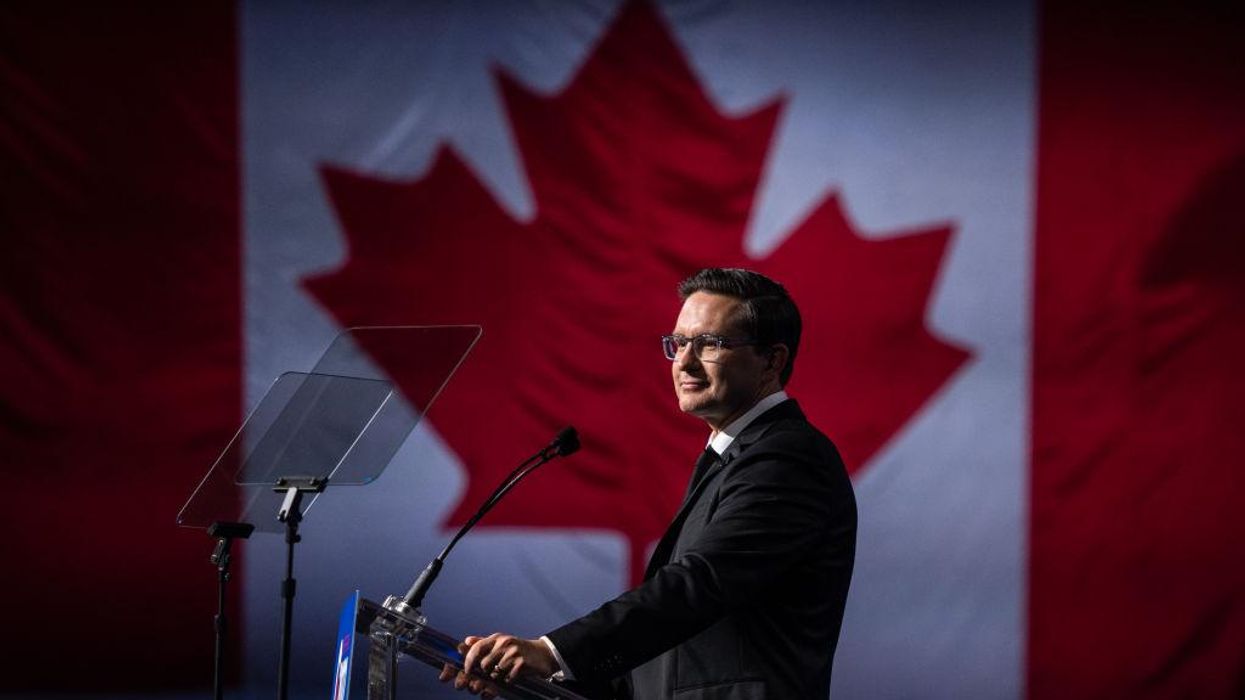
James Park/Bloomberg via Getty Images

After campaigning to stop the "have-yachts" from continuing to take advantage of the "have-nots," to combat "wokeism," and to counter "Justin-flation," the Alberta-born Pierre Poilievre was elected leader of the Conservative Party of Canada on September 10.
In Canada's equivalent of a primary election, the 43-year-old won in a landslide, taking 70.7% of over 400,000 votes (or 68.15% of the points). The former Liberal premier of Quebec, Jean Charest — who had aligned himself with the status quo that Poilievre means to disrupt — came in a distant second with 16.07%.
As leader of the official opposition party, Poilievre will now go toe to toe with the increasingly unpopular Canadian Prime Minister Justin Trudeau and potentially replace him in the next federal election.
In his victory speech, the married father of two reiterated his commitment to helping Canadians regain control over their finances, their lives, and their country. "Tonight begins the journey to replace an old government that costs you more and delivers you less with a new government that puts you first," he said.
\u201c"They don't need a government that sneers at them and calls them names. They don't need a government to run their lives. They need a government that can run a passport office,\u201d @PierrePoilievre says in his victory speech. #cdnpoli\u201d— True North (@True North) 1662866677
He reminded his audience that politicians are duty-bound to serve the electorate, not the other way around.
Poilievre suggested that Canadians "don't need a government that sneers at them and calls them names," calling to mind the recent memories of both Trudeau smearing the unvaccinated as "extremists who don't believe in science ... misogynists, also often racists" and Liberal party members condemning the Freedom Convoy's constituents as bigots.
"They don't need a government to run their lives," continued Poilievre. "They need a government that can run a passport office."
The Conservative leader plans to:
The Conservative leader has been a fierce critic of the federal Liberals' "unscientific mandates" and the "unacceptable limits on the freedoms of Canadians during the COVID-19 pandemic." He introduced Bill C278 in June, which would prevent the future imposition of vaccine mandates for employment and travel by the federal government.
In addition to supporting the Canadian truckers' Freedom Convoy, which protested the Trudeau government's COVID-19 mandates and travel bans, Poilievre was among the few members of parliament to join Canadian soldier James Topp in the final leg of his successful cross-continental march protesting vaccine requirements.
Canadian state media reported that Poilievre has been markedly consistent in his views. At age 20, while at the University of Calgary, he wrote, "The most important guardian of our living standards is freedom." Government's role "is constantly to find ways to remove itself from obstructing such freedoms."
Jean-Christophe Boucher, an associate professor of political science at the university, said that Poilievre, first elected at the age of 24, "was always perceived as somebody enthusiastic, charismatic, willing to fight and willing to engage on the level that was maybe abrasive."
Poilievre's combativeness has regularly been on display in the Canadian House of Commons, particularly as finance critic, in which role he routinely held the Liberal government to task for its spending.
Justin Trudeau, Pierre Poilievre get into heated debate about balancing of the budgetyoutu.be
Poilievre's sensitivity to the impact of inflationary spending on the working class may be due to his humble beginnings.
Unlike Trudeau, a rich prime minister's son, Poilievre was born to a 16-year-old unwed mother and raised by two prairie schoolteachers.
MacLean's reported that Poilievre grew up in the western province of Alberta, which he had seen "ravaged by Pierre Trudeau's National Energy Program." Then just as now, inflation was a problem, particularly for his working-class family, which had to move when living had become unaffordable. As he grew older, Poilievre noted learning "more about how that happened and why, it left a mark on me."
To tackle the inflation he believes now to be caused in part by Pierre Trudeau's son, Poilievre will work in the Canadian parliament to hold the Liberal party to task.
It may be some time, however, before he can challenge Trudeau in a federal election, on account of the so called confidence-and-supply agreement struck between the socialist NDP party and Trudeau's Liberals. The deal means the NDP will help protect Trudeau from successful votes of no-confidence and therefore a snap election until 2025.
Although evidently popular with conservative voters, Poilievre has many detractors in academia, in the media, and in Ottawa.
The Conservative leader suggested that "working class people are enthusiastic about my campaign for the same reason that the elite gatekeepers are having a meltdown over it: I will put people back in charge of their lives."
Recently, in the liberal Toronto Star, he was compared to former President Donald Trump and deemed "the most dangerous politician in the country right now."
"Like Trump's MAGA-themed populism," wrote Max Fawcett in Canada's National Observer, "Poilievre's politics are inherently corrosive to the broader project we call society."
The Canadian Union of Public Employees stated after the leadership election, "It's too bad that ... Pierre Poilievre does not hold American citizenship, because he would be right at home as Governor of a state like Alabama."
The well-established Canadian pundit and columnist Rex Murphy contrarily stated, "[Poilievre] could bring an end to our interminably woke-nattering government of virtue-signallers and identity mongers."
Murphy argued further: "A whole lot of Canadians, and not just Conservatives, have grown exceedingly irritated, beyond mere, annoyance, at the perpetual smug self-righteousness and cloying preachiness of the ultra-woke 'we always know best' Liberal leadership."